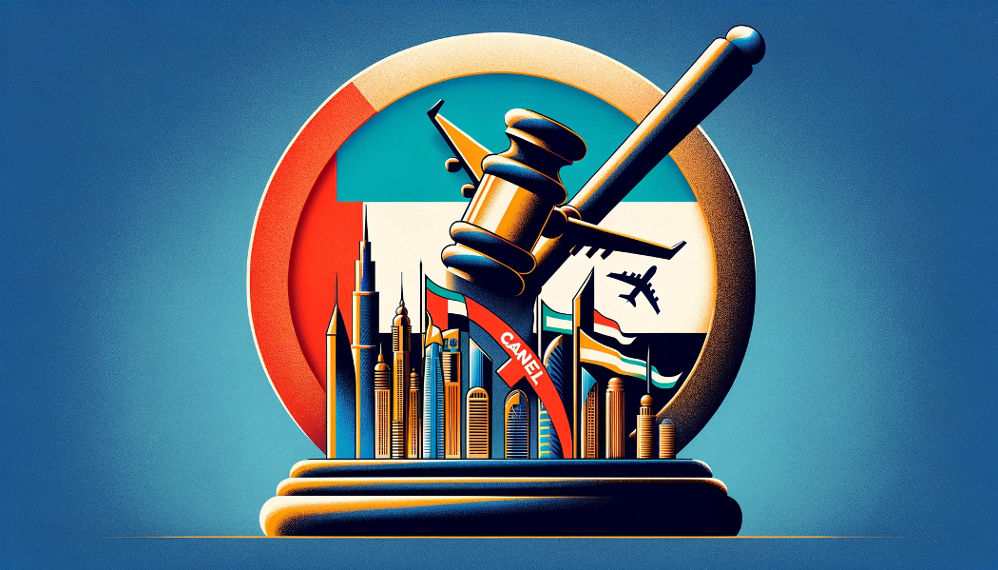When navigating the complexities of living or doing business in the United Arab Emirates (UAE), it’s crucial to understand how legal disputes and criminal cases can significantly impact one’s ability to travel freely. The UAE’s legal system, deeply rooted in both civil and Sharia law, takes a firm stance on ensuring justice and security within its borders. This commitment often involves the imposition of travel bans on individuals involved in legal and criminal matters. Below, we explore how such situations arise and their implications for residents and visitors alike:
Understanding Travel Bans in the Context of Legal and Criminal Disputes
-
Enforcement of Legal Accountability
- The UAE authorities use travel bans as a tool to ensure individuals involved in legal disputes or criminal cases remain within the country to face proceedings. This mechanism prevents the evasion of legal responsibilities by fleeing the jurisdiction.
-
Wide Range of Applicable Offenses
- Travel bans can be imposed for a variety of offenses ranging from minor legal disputes to serious criminal charges. Common triggers include financial misconduct (like fraud or embezzlement), personal disputes, and violations of public safety laws.
-
Immediate Legal Consequences
- Upon being implicated in a legal or criminal matter, individuals may find themselves immediately unable to leave the UAE. This restriction remains until the case is resolved or until a court decides to lift the ban.
-
Impact on Personal and Professional Life
- The imposition of a travel ban can have profound effects on one’s personal and professional life. It can disrupt travel plans, halt business operations, and strain family relationships, especially if the individual is a foreign national with ties abroad.
-
Resolution and Lifting of Travel Bans
- Resolving the underlying legal issue is the primary pathway to having a travel ban lifted. This may involve clearing debts, settling disputes out of court, or undergoing legal proceedings to address the accusations or charges.
-
Legal Representation and Advocacy
- Navigating the process of contesting or lifting a travel ban necessitates professional legal representation. Lawyers familiar with UAE law can offer invaluable assistance in understanding the specifics of one’s case, formulating a defense, and negotiating with plaintiffs or prosecutors.
-
Preventive Measures and Awareness
- Individuals can mitigate the risk of encountering such legal predicaments by staying informed about UAE laws and regulations, maintaining transparent financial dealings, and resolving disputes amicably whenever possible.
Check Criminal Status of Financial Cases
Final Thoughts
The UAE’s legal stance on ensuring accountability through travel bans reflects its broader commitment to law and order. For residents and visitors, a clear understanding of this aspect of the legal system is crucial for navigating life in the UAE without undue complications. Whether faced with a legal dispute or criminal charges, the key to overcoming the challenge lies in prompt, informed action and the support of competent legal counsel. Click for More UAE Visa information.
@Visaprocedures Tips for Understanding Travel Bans in the Context of Legal and Criminal Disputes
- Know the Basis: Travel bans can be issued for various legal reasons including criminal charges, financial disputes, or immigration violations. Understanding the specific reason behind a travel ban is crucial.
- Legal Representation: Seek the advice of a legal expert who specializes in the laws of the country enforcing the travel ban. A lawyer can provide guidance, represent you in legal proceedings, and work towards resolving the dispute.
- Check Status Regularly: If you suspect you might be under a travel ban, check your status through official government websites or by contacting the embassy. Some jurisdictions offer online services to check travel ban status.
- Comply with Legal Requests: If you are involved in a legal or criminal dispute, ensure you comply with all court orders and legal requests. Non-compliance can lead to a travel ban or exacerbate existing restrictions.
- Understand the Appeal Process: Familiarize yourself with the legal process to challenge or appeal a travel ban in the jurisdiction where it has been issued. This may involve submitting specific documents or appearing in court.
- Communicate with Employers: If you’re working and a travel ban affects your mobility, communicate with your employer about the situation. They may offer support or adjustments to your work arrangements.
- Financial Obligations: In cases where the travel ban is due to financial disputes, work towards settling outstanding debts or negotiate a payment plan. Sometimes, clearing financial obligations can lead to the lifting of the ban.
- Avoid Escalation: Do not attempt to leave the country by illegal means. This can lead to further legal complications and potentially harsher penalties.
- Documentation: Keep all relevant documents, correspondence, and legal papers in order. This documentation can be crucial in legal proceedings or when seeking to have the travel ban lifted.
- Stay Informed: Laws and policies regarding travel bans can change. Stay informed about any legal changes in the country where the travel ban is in place that might affect your situation.





